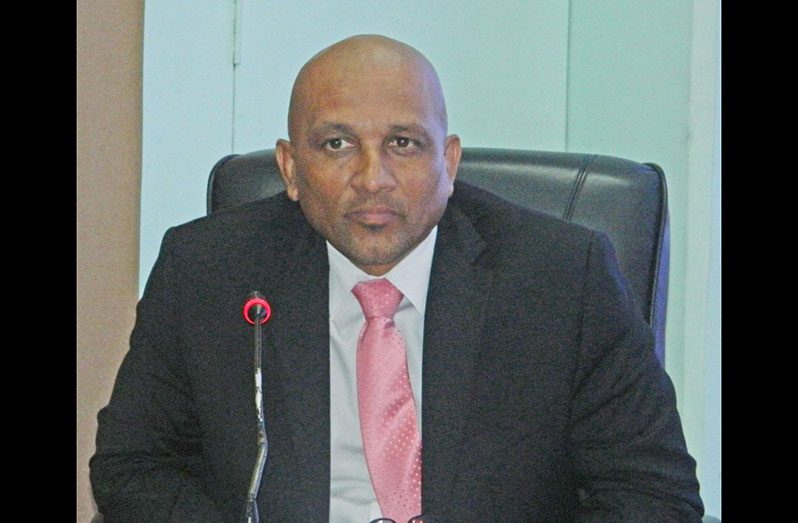A PROFESSIONALLY trained judicial officer, in this case a magistrate, is the most appropriate judicial officer to hear and determine guilt in the electoral fraud cases stemming from the March 2, 2020 General and Regional Elections, rather than a judge and jury.
This is according to Queen’s Counsel (QC) Darshan Ramdhani, the lead prosecutor in charge of the electoral fraud charges against former Guyana Elections Commission (GECOM) officials, Keith Lowenfield, Roxanne Myers and Clairmont Mingo and People’s National Congress Reform (PNC/R) chairperson, Volda Lawrence.
Ramdhani, during a press conference on Saturday, highlighted a number of factors which may only delay the determination of results and add to the expenses of the matters, one of which is moving the cases to the High Court for adjudication.
He explained that the offences with which Lowenfield, Mingo and Lawrence are charged are common-law offences, which attracts a sentence of one year imprisonment, and the sentence is within the jurisdiction of a magistrate to hand down.
Further, the learned counsel explained that transferring the cases of the High Court will see them being tried by a judge and jury, and taking into consideration Guyana’s polarised politics, the attorney believes it might be difficult to compose a jury of true impartiality.
“There is a large section of Guyana that votes for one party and there is another section that votes for another party; I believe every one of us have seen that in the voting results over the years in Guyana.
“So, I have asked the court that as a relevant factor in deciding whether or not you should keep the matter, you should consider that any jury pool that is likely to be selected is likely to have persons from both ends of the political divide,” he added.
Ramdhani highlighted that any doubts of an unbiased jury can be dismissed with a magistrate, a professional who presides over multiple cases on a daily basis, presiding over the matters until their completion, which is provided for by the law.
“Why do we want to put ourselves there? Why do we want to go there when we can have a judicial officer who is professional trained and on a daily basis disabuse their personal bias to preside over matters?” he asked.
However, after Ramdhani made similar submissions to the court on Tuesday last, attorney-at-law, Nigel Hughes, issued a statement quoting Ramdhani as saying that there can never be a fair jury trial in the High Court for political matters due to the Guyana’s political and ethnic divide.
However, Ramdhani, on Saturday, dismissed these allegations, noting he was “not at all speaking of any ethnic divide” but rather the phrase was “inserted into the conversation by Mr. Hughes.”
“There is nothing that introduces any ethnic element in my application, submissions, conversations with the court, so that is categorically not true and I also did not say that you cannot have a fair trial, I said this is a factor the court must consider,” Ramdhani said.
The Queens Counsel explained that when he raised the concerns with the court, he was not speaking of “facts” but merely raised “factors” for the court to take into consideration when determining how the matters are dealt with.
“We are before a judicial officer, the magistrate, and that magistrate will have to make a decision and that magistrate is expected to take relevant factors into consideration,” he said.
“So, the question of whether a jury pool would be comprised of people from both side of the divide is a possibility to likelihood and so I’m asking this court to deal with it in this sense,” he added.
He explained that regardless, if the cases are tried before a magistrate or judge and jury, the offences attract sentences of one year imprisonment and for the purposes of dealing with the cases in a swift manner, they should be tried summarily before a magistrate.
Attorney-at-law, Glen Hanoman, during an interview with the Guyana Chronicle earlier in the year, had also explained that it is most “convenient” and “efficient” for the cases to be disposed of at the magistracy level, and that it was unusual for the defence to indicate that it would prefer otherwise.
Hanoman had explained that there is an argument open to the defence in the High Court to say that because of the pre-trial publicity of matters, no jury is unbiased enough to try the matter, risking the matters to be stayed indefinitely.
“The type of offence which the accused are charged with, in this jurisdiction or in any jurisdiction, that type of matter is never tried before a judge and jury. It would be highly unusual for a matter of this nature to go before a judge and jury,” Hanoman had said.
Lowenfield, Myers, and Mingo, along with Lawrence; Opposition activist, Carol Joseph; the CEO’s clerks, Michelle Miller and Denise Bob-Cummings; Elections Officer, Shefern February, and Information Technology Officer, Enrique Livan, were all charged and are currently before the court.
They are all accused of inflating the results of Region Four, Guyana’s largest voting district, to give the APNU+AFC coalition a majority win at the March 2, 2020 polls, when, in fact, the PPP/C had won by 15,000 more votes.




.png)









